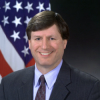Stephen Cambone

Stephen Cambone
Stephen A. Cambonewas the first United States Under Secretary of Defense for Intelligence, a post created in March 2003. Cambone first came to the attention of the public at large during the testimony of Major General Antonio Taguba before the U.S. Senate Armed Services Committee, where he disputed the General's statement that prison guards were under the effective control of military intelligence personnel and interrogators. Cambone resigned at the beginning of 2007 and was replaced by James R. Clapper, Jr.,...
NationalityAmerican
ProfessionPolitician
CountryUnited States of America
That's driven by any number of factors, the most prominent of which have been the combat experience of two major campaigns - one in Afghanistan and the other in Iraq - and the ongoing demands of the global war on terrorism.
So we have a group within the office that is devoted to support for the war fighter. That's, of necessity, an operational and tactical level of concern.
And then fourth, we have that essential group of people who track programs and budgets to ensure that they align with the needs of preparation and warning, counterintelligence and support to the operational war fighter.
And to do that not only for the war fighter, but also to help prepare the people in the acquisition, personnel and policy worlds who need to make adjustments in the department's business, which itself may take 10 or 15 years to accomplish.
One is to ensure that the war fighters and the intelligence analysts get the information that they need when they need it, in a format that's useful to them.
It's easy to measure success by the number of dollars spent or by the number of programs initiated, without having too much regard for what was bought and how useful it was to the people who need it - the war fighter and the analyst.
There already is an increased level of cooperation and coordination among the various agencies within the intelligence community.
Nothing I just said in describing the functions of this office has anything to do with intelligence collection, processing, analysis or operations.
The office has oversight of people who do analysis and oversight of people who do operations, but it is not charged with doing either. That is an important point to make. Those functions are performed by the CIA, DIA and other agencies.
We've complemented that with a second office to think about how we need to prepare ourselves for that period 10 or 15 or 20 years from now, by way of investment in our technology, our organization and our people.
And the reason for focusing on that time frame is that it's going to take us a considerable period of time to develop the new capabilities, processes and organizations that will be needed.
Where we have the choice between putting a dollar against those that are going to advance horizontal integration and those that are going to sustain current capability, we'd rather put them against the horizontal integration activity.
The third group is focused on counterintelligence and security. I think the reason for that is fairly evident, in terms of vulnerabilities of the department and the harm that can come to it by failing to detect when we have, in fact, been harmed.
Thirdly, as we move through this process of integrating the communications, we will begin to emulate more of the World Wide Web in our work in the future.